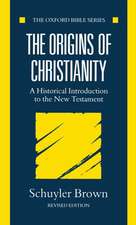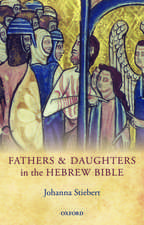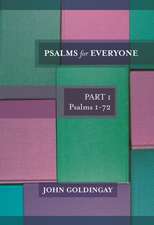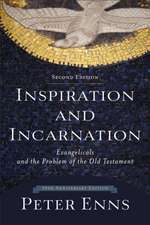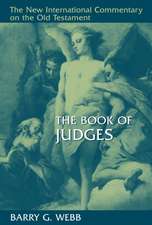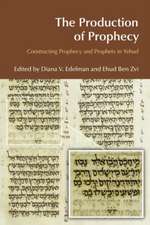Divinely Abused: A Philosophical Perspective on Job and his Kin
Autor Dr N. Verbinen Limba Engleză Paperback – 26 oct 2011
| Toate formatele și edițiile | Preț | Express |
|---|---|---|
| Paperback (1) | 255.38 lei 6-8 săpt. | |
| Bloomsbury Publishing – 26 oct 2011 | 255.38 lei 6-8 săpt. | |
| Hardback (1) | 772.17 lei 6-8 săpt. | |
| Bloomsbury Publishing – 10 apr 2010 | 772.17 lei 6-8 săpt. |
Preț: 255.38 lei
Preț vechi: 330.08 lei
-23% Nou
Puncte Express: 383
Preț estimativ în valută:
48.87€ • 50.64$ • 40.79£
48.87€ • 50.64$ • 40.79£
Carte tipărită la comandă
Livrare economică 21 martie-04 aprilie
Preluare comenzi: 021 569.72.76
Specificații
ISBN-13: 9781441138569
ISBN-10: 1441138560
Pagini: 184
Dimensiuni: 156 x 234 x 10 mm
Greutate: 0.26 kg
Editura: Bloomsbury Publishing
Colecția Continuum
Locul publicării:London, United Kingdom
ISBN-10: 1441138560
Pagini: 184
Dimensiuni: 156 x 234 x 10 mm
Greutate: 0.26 kg
Editura: Bloomsbury Publishing
Colecția Continuum
Locul publicării:London, United Kingdom
Caracteristici
Engages with the concept of suffering, of reconciling this suffering with the idea of God, and therefore with the larger philosophical area of the problem of evil.
Notă biografică
N. Verbin is an Assistant Professor at Tel Aviv University and a senior research fellow at the Shalom Hartman Institute in Jerusalem.
Cuprins
Preface
Chapter 1: What is Abuse?
1. Self-Worth
a. Self-Worth and Justification
b. Resentment and Self-Worth
2. Happiness
a. The Socratic Conception
b. The Maimonidean Conception
c. The Wittgensteinian Conception
3. Power
a. The Intuitive Paradigm
b. The Moral Paradigm
c. The Self-Restraint Paradigm
Chapter 2: Divine Abuse
1. Job's Conception of Happiness
a. The Worldly Conception
b. The Moral Conception
2. Job's Conception of Self-Worth
a. Divine Abuse: Humiliation and Elevation
b. Resentment and Moral Hatred of God
3. Power and Power Relations
a. Job's Conception of Power
b. Job's Way of Exercising his Power
Chapter 3: The Way Out: From Abuse to Suffering
1. Afflictions of Love and Love of Afflictions
a. Afflictions of Love
b. Love of Afflictions: The Sadist, the Masochist and the Slave
2. Providence and Intervention
a. Providence as Intervention
b. Maimonides
c. Simone Weil
3. Providence Lost
a. Afflictions of Hate
b. Malevolent Providence
c. From Abuse to Suffering
Chapter 4: Forgiveness
1. The Victim
a. Harms, Wrongs and Hostile Emotions
b. Resentment and Reason
c. Overcoming Resentment
2. The Assailant
a. Telling the Moral Story
b. Telling the Biographical Story
c. Telling the Same Story
3. Forgiveness
a. Forgiveness without Reconciliation
b. Reconciliation without Forgiveness
c. Forgiveness and Reconciliation
Chapter 5: Forgiving God
1. Protest
a. Roth's Theodicy of Protest
b. Blumenthal's Theology of Protest
2. Beyond Protest
a. Protest in Context
b. Beyond Protest
3. Forgiving God
a. The Logical Space for Forgiveness
b. Forgiving God
c. Subsisting in Brokenness
Conclusion
Bibliography
Chapter 1: What is Abuse?
1. Self-Worth
a. Self-Worth and Justification
b. Resentment and Self-Worth
2. Happiness
a. The Socratic Conception
b. The Maimonidean Conception
c. The Wittgensteinian Conception
3. Power
a. The Intuitive Paradigm
b. The Moral Paradigm
c. The Self-Restraint Paradigm
Chapter 2: Divine Abuse
1. Job's Conception of Happiness
a. The Worldly Conception
b. The Moral Conception
2. Job's Conception of Self-Worth
a. Divine Abuse: Humiliation and Elevation
b. Resentment and Moral Hatred of God
3. Power and Power Relations
a. Job's Conception of Power
b. Job's Way of Exercising his Power
Chapter 3: The Way Out: From Abuse to Suffering
1. Afflictions of Love and Love of Afflictions
a. Afflictions of Love
b. Love of Afflictions: The Sadist, the Masochist and the Slave
2. Providence and Intervention
a. Providence as Intervention
b. Maimonides
c. Simone Weil
3. Providence Lost
a. Afflictions of Hate
b. Malevolent Providence
c. From Abuse to Suffering
Chapter 4: Forgiveness
1. The Victim
a. Harms, Wrongs and Hostile Emotions
b. Resentment and Reason
c. Overcoming Resentment
2. The Assailant
a. Telling the Moral Story
b. Telling the Biographical Story
c. Telling the Same Story
3. Forgiveness
a. Forgiveness without Reconciliation
b. Reconciliation without Forgiveness
c. Forgiveness and Reconciliation
Chapter 5: Forgiving God
1. Protest
a. Roth's Theodicy of Protest
b. Blumenthal's Theology of Protest
2. Beyond Protest
a. Protest in Context
b. Beyond Protest
3. Forgiving God
a. The Logical Space for Forgiveness
b. Forgiving God
c. Subsisting in Brokenness
Conclusion
Bibliography
Recenzii
"Nehama Verbin has written an important and original book. Through an insightful study of Job's relation to his God, she offers fresh insights into key notions in ethics and the philosophy of religion, such as affliction, faith, and forgiveness . Her acute and probing discussions of these will leave moral philosophers, philosophers of religion, and students of the Book of Job deeply in her debt." -- Professor Peter A. Byrne, Emeritus Professor of Ethics and the Philosophy of Religion, King's College London, UK.
"Focused on the book of Job, these systematic reflections on the perennial themes of power, dependency, suffering and reconciliation provide rich food for thought." -- John Cottingham, Professor Emeritus of Philosophy, University of Reading, UK
"Through an original and subtle reading of the book of Job, Verbin offers us one of the most compelling and philosophically astute accounts of suffering within the religious stance. Verbin's gripping, lucid and deep discussion is of great importance to the ongoing conversation of the human encounter with evil." -- Moshe Halbertal, Professor of Jewish Thought and Philosophy, Hebrew University, Israel
"Verbin studies the instances of abuse delivered by God in the Old Testament's book of Job. The differences between suffering and abuse are presented and applied to the story in an agnostic manner. The injustices inflicted upon Job lead to feelings of cynicism and hatred of his abuser thus causing a religious dilemma. Drawing from psychological, philosophical, and theological references on happiness, self-worth, and forgiveness, Verbin provides an insightful analysis of Job's dilemma. Job's ultimate position of forgiveness is presented as empowering as his relationship with God is not restored to the intimacy it had once enjoyed, but rather, to a distant relationship of caution." -Eithne O'Leyne, BOOK NEWS, Inc.
"Focused on the book of Job, these systematic reflections on the perennial themes of power, dependency, suffering and reconciliation provide rich food for thought." -- John Cottingham, Professor Emeritus of Philosophy, University of Reading, UK
"Through an original and subtle reading of the book of Job, Verbin offers us one of the most compelling and philosophically astute accounts of suffering within the religious stance. Verbin's gripping, lucid and deep discussion is of great importance to the ongoing conversation of the human encounter with evil." -- Moshe Halbertal, Professor of Jewish Thought and Philosophy, Hebrew University, Israel
"Verbin studies the instances of abuse delivered by God in the Old Testament's book of Job. The differences between suffering and abuse are presented and applied to the story in an agnostic manner. The injustices inflicted upon Job lead to feelings of cynicism and hatred of his abuser thus causing a religious dilemma. Drawing from psychological, philosophical, and theological references on happiness, self-worth, and forgiveness, Verbin provides an insightful analysis of Job's dilemma. Job's ultimate position of forgiveness is presented as empowering as his relationship with God is not restored to the intimacy it had once enjoyed, but rather, to a distant relationship of caution." -Eithne O'Leyne, BOOK NEWS, Inc.




